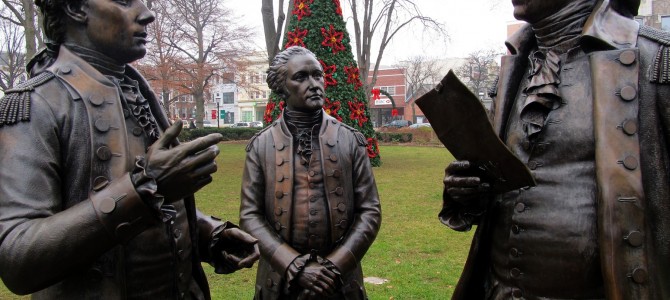A review of “How Adam Smith Can Change Your Life: An Unexpected Guide To Human Nature and Human Happiness,” by Russ Roberts. Portfolio, October 2014.
The greatest difficulty we face today in understanding America’s founding is understanding the founders. Many thoughtful scholars and dedicated patriots rally around the Declaration and the Constitution in ways that, though well-intended, reveal their lack of understanding of the ideas that shaped the founders’ thinking. They are unaware of the extent to which their own thinking has been captured by the postulates they seek to oppose. It is no secret that there has been a century-long and very successful assault on the system the founders crafted for us. What is not so well appreciated is how successful the assault on their thinking has been.
The founders’ thinking explains why the American Revolution was so different from the revolutions in England and France. England quickly secured for itself a renewal of its monarchy, though on improved, non-absolutist terms. The Glorious Revolution resulted in a coalition of Whigs and Tories inviting William and Mary to come from the Netherlands to replace James II.
France got the blood-drenched Terror, which featured decapitations and heads on stakes somewhat in the manner of the current fashion in the Middle East, and eventually a new absolutism under Emperor Napoleon worse than that of Louis XIV.
America’s Revolution Was Different
America’s revolution had a radically different outcome. That great difference is a good measure of how different the thinking of the founders was. Yet many today attempt to explain the founding by tracing its continuity with the Glorious Revolution, or even its debt to the ideas of the philosophes, or perhaps some combination of the two. They do so, I submit, because those are the ideas they have to work with. In fairness, it is true that the revolutions in England and France are relatively easy to understand, certainly easier to understand than the American one. Understanding the American Revolution and its outcome can be a challenge, especially if the ideas that guided the American founders are not at hand.
The founders’ thinking was rooted in and guided by a profound and subtle conception of human nature. That conception was both deeply moral—witness the magnificence of their noble purpose—and thoroughly practical—witness its success. Because political theory is a branch of moral philosophy, a sure grasp of the founders’ view of human nature puts understanding their political thinking within our reach.
Russ Roberts’ delightful little book, “How Adam Smith Can Change Your Life,” provides the treatment we, and our fellow citizens, need. Written in an accessible style and aimed at a popular audience, it presents itself in the guise of a self-help book offering a guide to happiness, complete with a chapter entitled “How To Be Happy.” It does not present itself as the founders’ guidebook for how to live as an American citizen, though, marketing considerations aside, I would offer that as an excellent alternative subtitle.
A Refresher on the Pursuit of Happiness
Roberts has done something for which we must all be grateful. He has made Adam Smith’s other masterpiece, “The Theory of the Moral Sentiments,” completely accessible and completely understandable. In doing so, he has provided us with a profoundly revealing examination of the theory of human nature according the American founders: man the social being, endowed with moral sentiments, with a moral sense. The founders were focused on their political enterprise, not moral philosophy, but Smith’s ideas, beautifully expressed by Roberts, provide us with deep insight into the vision of human nature the founders shared.
For readers of The Federalist I hasten to add that by the penultimate chapter Roberts even gets around to drawing the political implications, and very adroitly, too. The political theory that fits the founders’ vision of human nature and human happiness—I remind you of that phrase “the Pursuit of Happiness” which so often puzzles those who write about the American founding—is properly called classical liberalism. By the way, Roberts’ excellent discussion of classical liberalism begins on page 203. I mention the page number because there is no entry for classical liberalism in the index. That fact is both totally unsurprising (I looked for it, expecting it to be missing) and profoundly revealing. The political theory of the founders is so consistently overlooked that it often goes missing from the index.
Roberts convincingly makes the case that “Sentiments” is a great book we should have been reading and re-reading all along. He also presents a “lovely” (that is a technical term, which you will understand when you read the book) solution to the so-called Adam Smith Problem. Much ink has been spilled by scholars who are confounded by the fact that Smith wrote both “The Moral Sentiments” and “The Wealth of Nations.” Those scholars find a problem where there is none. Reading Roberts will convince you that there is no such problem, only a lack of understanding.
That lack of understanding is simply a part of the pervasive lack of understanding that includes our difficulties in understanding the founders. Roberts provides a well-lighted place for all of us, scholars and citizens alike, to begin to find a secure footing for our explorations of the ideas and the world the founders gave us.









